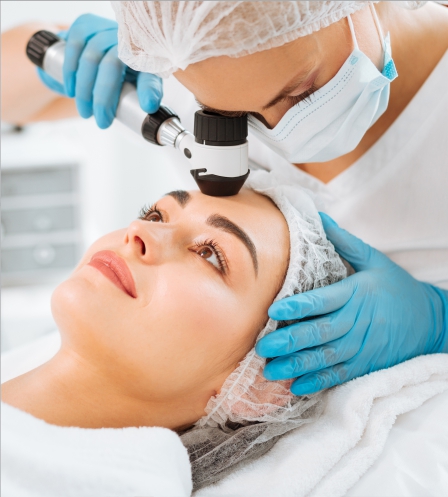🩺 By Dr. Vidushi Agarwal, Consultant Dermatologist – Primax Hospital
Introduction
Your skin is more than just a protective barrier; it’s a reflection of your overall health and well-being. As a dermatologist, I’ve witnessed how proper skin care can transform not only appearances but also confidence and quality of life. This guide aims to provide you with essential insights and practical tips to maintain healthy, radiant skin throughout your life.
1. Understanding Your Skin: The Basics
- Skin Structure: Comprises three layers – epidermis, dermis, and subcutaneous tissue.
- Functions:
- Protection against environmental factors.
- Regulation of body temperature.
- Sensory perception.
- Skin Types:
- Normal
- Dry
- Oily
- Combination
- Sensitive
Identifying your skin type is crucial for selecting appropriate skincare products and routines.
2. Common Skin Concerns and Conditions
- Acne: Often caused by clogged pores, bacteria, and hormonal imbalances.
- Eczema: Characterized by dry, itchy, and inflamed skin.
- Psoriasis: An autoimmune condition leading to red, scaly patches.
- Hyperpigmentation: Darkened areas due to excess melanin production.
- Rosacea: Chronic redness and visible blood vessels, primarily on the face.
Early diagnosis and treatment are key to managing these conditions effectively.
3. Daily Skincare Routine: The Foundation of Healthy Skin
- Cleansing:
- Use a gentle cleanser suitable for your skin type.
- Avoid over-washing, which can strip natural oils.
- Moisturizing:
- Hydrates the skin and maintains its barrier function.
- Choose non-comedogenic products to prevent pore clogging.
- Sun Protection:
- Apply broad-spectrum sunscreen with at least SPF 30 daily.
- Reapply every two hours when outdoors.
Consistency in your skincare routine yields the best results over time.
4. The Role of Diet and Hydration
- Nutrition:
- Incorporate fruits, vegetables, lean proteins, and healthy fats.
- Antioxidant-rich foods combat free radicals that age the skin.
- Hydration:
- Drink ample water to maintain skin elasticity and flush out toxins.
- Limit caffeine and alcohol, which can dehydrate the skin.
A balanced diet and proper hydration are integral to skin health.
5. Lifestyle Factors Affecting Skin
- Sleep:
- Aim for 7-9 hours of quality sleep to allow skin repair.
- Stress Management:
- Chronic stress can exacerbate skin conditions like acne and eczema.
- Practice relaxation techniques such as meditation or yoga.
- Exercise:
- Regular physical activity improves circulation, delivering nutrients to the skin.
Adopting a healthy lifestyle supports overall skin vitality.
6. Anti-Aging Strategies
- Preventive Measures:
- Avoid excessive sun exposure.
- Refrain from smoking, which accelerates skin aging.
- Skincare Ingredients:
- Retinoids stimulate collagen production.
- Vitamin C brightens skin and reduces fine lines.
- Professional Treatments:
- Chemical peels, microdermabrasion, and laser therapy can rejuvenate the skin.
Consult a dermatologist to tailor anti-aging strategies to your needs.
7. Importance of Regular Skin Check-Ups
- Early Detection:
- Regular examinations can identify skin cancers and other issues early.
- Personalized Advice:
- Dermatologists can recommend products and treatments suited to your skin type and concerns.
- Monitoring Changes:
- Keep track of moles or spots that change in size, shape, or color.
Annual skin evaluations are a proactive step in maintaining skin health.
8. Embracing Your Skin Journey
- Self-Acceptance:
- Understand that perfect skin is a myth; focus on health over perfection.
- Education:
- Stay informed about skincare ingredients and practices.
- Patience:
- Skin improvements take time; avoid the temptation of quick fixes.
Your skin tells your unique story—nurture it with care and compassion.
Final Thoughts from Dr. Vidushi Agarwal
Investing in your skin is an investment in your overall health and confidence. By understanding your skin’s needs and adopting a consistent care routine, you can achieve and maintain radiant skin at any age. Remember, your skin is a reflection of your inner well-being—treat it with the respect and attention it deserves.









